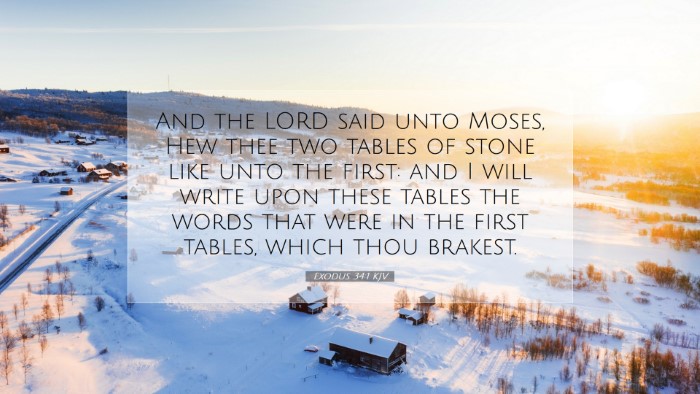Commentary on Exodus 34:1
Verse: Exodus 34:1 - "And the LORD said unto Moses, Hew thee two tables of stone like unto the first: and I will write upon these tables the words that were in the first tables which thou brakest."
Introduction
Exodus 34:1 occupies a significant place in the unfolding narrative of God’s covenant with His people. This verse marks a pivotal moment in the relationship between God and Israel, following a profound act of rebellion on the part of the Israelites. In this analysis, we will explore various theological themes and insights offered by prominent public domain commentators, including Matthew Henry, Albert Barnes, and Adam Clarke.
The Need for Renewed Tables
Matthew Henry emphasizes the importance of God's command to Moses to prepare new tablets of stone. The very act of hewing these tablets indicates a need for renewal after the original tablets were shattered due to Israel's sin with the golden calf. This renewal reflects not only God's justice but also His mercy. God’s willingness to rewrite His law is indicative of His continual desire for reconciliation with His people.
Albert Barnes notes that the tablets served as a tangible representation of God’s covenant. By instructing Moses to cut out new tablets, God reaffirms His covenantal relationship with Israel despite their past transgressions. This restoration highlights the theme of divine forgiveness, as God shows His readiness to restore what was lost due to human failure.
Covenantal Significance
The act of writing on the tablets is significant for understanding the nature of God’s covenant with Israel. Adam Clarke provides insight into the symbolic meaning behind the tablets of stone. The laws written on the stones represent God's eternal and unchanging nature, as well as the seriousness with which He regards His commandments. Clarke also points out that the repetition of the law illustrates its foundational role in the life of the Israelites and their need to adhere to it in order to maintain their covenantal relationship.
God’s Character Revealed
In this directive, we see a revelation of God’s character. Matthew Henry suggests that God’s instructions were not arbitrary; rather, they reflected His holy and just nature. He insists that God was teaching Moses and the people about the severity of sin and the need for atonement. The destruction of the first tablets serves as a stark reminder of the consequences of disobedience. However, God's willingness to give the law again is a testament to His grace.
Theological Insights
- Grace and Restoration: The renewal of the covenant underscores the grace that God extends to His people. Albert Barnes asserts that even after their grave sin, God does not abandon Israel but seeks to restore them to a right relationship.
- Human Responsibility: Adam Clarke highlights that Moses must take action (hew the stones). This implies that while God is gracious, human cooperation and repentance are necessary components in the process of restoration.
- Perseverance of God: The repeated giving of the law shows God's unwavering commitment to His people. Matthew Henry points out that even when humanity fails, God remains faithful to His promises.
The Role of Moses
Moses plays a critical role in this narrative, acting as the mediator between God and Israel. Albert Barnes discusses Moses' leadership and how he intercedes on behalf of the people. The preparation of the new tablets not only serves a divine purpose but also reinforces Moses' responsibility as a leader committed to guiding his people in their relationship with God. Clarke remarks on the significance of Moses' actions in fulfilling God’s command, showing his obedience and leadership qualities in the face of previous failures.
Conclusion
Exodus 34:1 is rich with theological significance, highlighting themes of renewal, grace, human responsibility, and the unwavering commitment of God to His covenant people. Through the insights of Matthew Henry, Albert Barnes, and Adam Clarke, we are reminded of the gravity of sin, the necessity of obedience, and the profound depths of divine mercy and restoration. As pastors, students, theologians, and scholars reflect on this verse, it serves as a reminder of the hope found in God’s continual willingness to restore and renew His covenant with His people.


